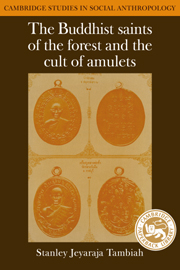Book contents
- Frontmatter
- Contents
- Acknowledgments
- Note on transcription
- 1 Introduction and manifesto
- Part I The arahant and the Path of Meditation
- Part II The hagiography of a Buddhist saint: text and context; the politics of sectarianism
- Part III The cult of amulets: the objectification and transmission of charisma
- Part IV Conceptual and theoretical clarifications
- Notes
- Index
- CAMBRIDGE STUDIES IN SOCIAL ANTHROPOLOGY
1 - Introduction and manifesto
Published online by Cambridge University Press: 10 December 2009
- Frontmatter
- Contents
- Acknowledgments
- Note on transcription
- 1 Introduction and manifesto
- Part I The arahant and the Path of Meditation
- Part II The hagiography of a Buddhist saint: text and context; the politics of sectarianism
- Part III The cult of amulets: the objectification and transmission of charisma
- Part IV Conceptual and theoretical clarifications
- Notes
- Index
- CAMBRIDGE STUDIES IN SOCIAL ANTHROPOLOGY
Summary
Although it stands by itself and is an autonomous whole, this book should also be regarded as complementary to my previous effort, World Conqueror and World Renouncer: A Study of Buddhism and Polity in Thailand against a Historical Background. At various points it intersects with themes and issues developed in the earlier one: These intersections are indicated in footnotes. Together this book and its predecessor should fuse into a larger cumulative whole.
World Conqueror and World Renouncer was essentially a discussion of the dialectical relations between the Buddhist sangha (order of monks) and the Thai polity, whose apex was kingship, during the nineteenth and twentieth centuries. The Thai polity was a member of the larger family of Theravāda Buddhist polities of South and Southeast Asia. These polities shared certain presuppositions and values regarding their constitution, of which the most prominent was a symbiosis and mutuality between the sangha as an order of monks dedicated to the vocation of liberation and the king as a righteous ruler whose obligation was to protect and secure the religion of the Buddha as the special treasure of his people. The importance of this overarching principle that characterized these Buddhist polities prompted me to outline in the first part of World Conqueror and World Renouncer, so as to serve as a doctrinal and historical backdrop, the normative ideas developed and/or embedded in early Buddhism concerning kingship, society, and polity, the relations between the bhikkhu (monk) and laity, and the constitution of monastic communities and their relations to the larger sociopolitical context.
- Type
- Chapter
- Information
- Publisher: Cambridge University PressPrint publication year: 1984



